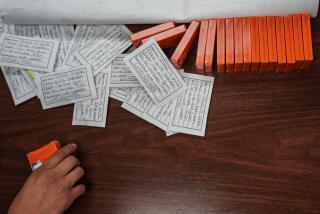Philip Morris Trial Set to Begin
- Share via
A Newport Beach woman who contracted lung cancer after decades of smoking is headed for trial against Philip Morris Cos. in a case that could determine whether new rules of evidence in California tobacco cases can help cigarette makers halt a string of disastrous courtroom losses.
Opening statements are scheduled for Tuesday in Los Angeles Superior Court in the case brought by Betty Bullock, 63, who started smoking in the 1950s at the age of 17 and was diagnosed with cancer in February 2001. Bullock, whose favorite brands were Marlboros and Benson & Hedges, has accused Philip Morris of negligence, fraud and making a defective product.
Philip Morris has denied the claims. “We believe the evidence will show that nothing Philip Morris did caused her to start or continue smoking,” said Maurice A. Leiter, a lawyer for Philip Morris.
The Bullock case will be the first tried in California under ground rules recently set by the state Supreme Court. As a result, it is being watched closely by Wall Street and legal analysts as a test of the industry’s ability to defend itself successfully in what probably is the country’s most anti-smoking state.
The Supreme Court, in a pair of Aug. 5 rulings, reinstated two tobacco cases that had been dismissed before trial. In the process, the court declared that cigarette makers cannot be held liable for statements or acts during a 10-year period when lawsuits against them were banned in California.
The ruling means that from now on, plaintiffs’ lawyers can’t cite evidence of alleged industry misconduct from 1988, when the Legislature imposed the lawsuit ban, until 1998, when it was repealed.
Analysts say the rulings, by barring some evidence used by plaintiffs in the past, should be a boon to cigarette makers. But it’s not clear that it will make much difference.
Since being stripped of its immunity from lawsuits in California, the industry has been hit with three straight mega-verdicts--reflecting jurors’ reaction to documents suggesting that cigarette makers had falsely disputed the risks of smoking and sought to conceal and enhance the addictiveness of their products.
Virtually all such documents from 1988 through 1997 will be removed from the plaintiffs’ arsenal under the Supreme Court decision. But the most potent of the inflammatory documents--from the 1950s, ‘60s, and ‘70s--will remain fair game.
Lawyers for Bullock and Philip Morris spent last week picking a panel of 16 jurors and alternates, consisting of nine women and seven men.
All will hear the case, and the 12 jurors will be randomly selected when deliberations are ready to start.
Testimony before Los Angeles Superior Court Judge Warren L. Ettinger could last six weeks.
Among witnesses expected to appear is Sir Richard Doll, 89, a British epidemiologist who in the early 1950s co-authored ground-breaking research on the link between smoking and lung cancer.
Philip Morris, the world’s biggest tobacco company, will be represented by lawyers from Arnold & Porter, including Leiter and Peter Bleakley.
Bullock lawyer Michael Piuze previously represented lung cancer victim Richard Boeken, whose case brought the industry’s worst defeat at the hands of an individual smoker. In June 2001, a Los Angeles jury ordered Philip Morris to pay Boeken $5 million in compensatory and $3 billion in punitive damages (the trial judge later trimmed the punitive award to $100 million).
Piuze said Bullock had believed “the tobacco industry’s lies for many decades” and “was horrified that Philip Morris admitted that its cigarettes caused lung cancer at around the same time that she was diagnosed with lung cancer.”
“Before Mrs. Bullock dies ... she’d like to do whatever she can to help Philip Morris get its just deserts,” Piuze said.
Although the Supreme Court decision does not appear to be a significant barrier to Bullock and other plaintiffs, it could jeopardize the previous verdicts, which used some documents and other exhibits from the period of the lawsuit ban. Retrials could be ordered if it is found that the verdicts were influenced by evidence that should not have been admitted.
In the first of the cases, in March 1999 a San Francisco jury ordered Philip Morris to pay Patricia Henley, a longtime Marlboro smoker, compensatory and punitive damages of $51.5 million--later reduced by the trial judge to $26.5 million. An appeals court upheld the award, and the case is now before the state Supreme Court.
The following year, Philip Morris and R.J. Reynolds were ordered to pay $21.7 million to Leslie J. Whiteley of Ojai, who died shortly after the verdict.
And last June, in the first tobacco case ever tried in Los Angeles County, a Superior Court jury awarded more than $3 billion to Boeken, who has since died.
More to Read
Inside the business of entertainment
The Wide Shot brings you news, analysis and insights on everything from streaming wars to production — and what it all means for the future.
You may occasionally receive promotional content from the Los Angeles Times.









